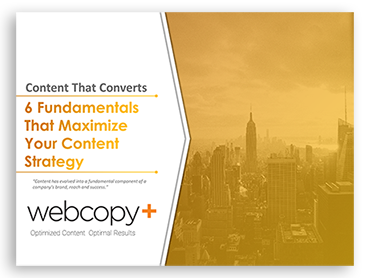
With technological advances, and templates galore available on the Web, it’s a wonder the average person hasn’t become a web designing guru by now. You’ve got a blog, you’ve got iWeb, and you know how to copy and paste from a source page, so what more do you need, right?
Webcopyplus is here to let you in on some secrets. There’s a lot more to good web design than you might think.
Here are some reasons why you’ve convinced yourself you can design your own website:
1. Almost Anyone Can Design Thanks to Modern Technology
Programs like iWeb are really neat because they empower the average user to build websites without the need to hire a professional. You can watch the tutorial, choose your template design, and even adjust the design to your liking by deleting certain elements and adding others. You can easily add your own photos, and even add widgets that allow you to incorporate YouTube videos and Google Maps, for example. Then, you simply publish your new site to the Web using whatever hosting arrangement you choose, and voila! You’re on the Web with the best of ‘em, right?
Wrong. The iWeb method of ‘web design’ (if you can call it that) might be fine for a kid who wants to share his fishing photos with the world, or a food blogger who wants to share their recipes, but it just doesn’t cut it when you’re building a website for a business with needs that can be far more complex. If you want to fully leverage the power of the many website features available, like e-commerce systems, for example, a professional web designer can help you achieve this by creating a design that supports this functionality.
Additionally, using a template doesn’t exactly paint your business in a favourable light. Anyone can use a template. Wouldn’t you rather have an original design for your website that shows how your business stands out from the rest?
2. You Can Just Use Facebook
In his article on Marketing Profs Daily Fix, titled With Facebook Pages, Who Needs a Website?, Paul Danay argues just that. He outlines all the amazing features that come with setting up a page for your business on Facebook, including:
- It’s totally free, including hosting
- It’s public, and indexable on search engines
- You can create unique URLs for individual landing pages, customized for ‘fans’ and ‘non-fans’ (a.k.a. people who have officially declared their support for your business on Facebook — which has since changed to ‘liking’ your page, rather than ‘becoming a fan’)
- You can host all your videos (as long as they’re under 10MB)
- You can upload your entire product catalogue, with descriptions
- You can post events
- You can add custom applications like Slideshare, for example
- You can run contests and surveys
- You can host a blog and connect your status updates with your Twitter account
- You can send messages to your page members for free
- You can buy targeted ads
Seems pretty ideal, no? Before you abandon your plans to build a website for your business in favour of all of these great things a Facebook page can do, you should consider a few great points made by web professionals who commented on Danay’s article. Here are just a few:
Not Everyone Is On Facebook
Sure, it may have surpassed Yahoo as the second most popular site in the United States in January 2010 (source: compete.com), while being hot on Google’s trail, but that doesn’t mean that all of your current or potential customers are using it. Remember that Facebook is more popular with certain demographics than others. Also, even though your page might still be viewable to people who do not have Facebook accounts, they won’t be able to participate in all of the elements you’ve created to engage the members of your page (including discussions, contests, and messages).
Facebook Is Only One Piece of the Puzzle
One commenter pointed out that in order to maximize your presence on the Web, you should not only have social media presence, but also a website. This is because you can connect all of your accounts, and take advantage of exposure to every possible prospect on the Web according to how he or she chooses to use it. By having a Facebook page, a Twitter account, a YouTube account, and a website, you can interconnect everything and expand your exposure across the Web, allowing you to reach a larger number of people.
Social Media Popularity Is Unpredictable
Just like technology, social media is constantly changing. New sites and experiences are being created every day, and it’s impossible to know which will be around for the long run. For example, Twitter and Facebook have all but obliterated MySpace. Who is to say that Facebook might go the same route as soon as a better option is created? Heck, there are rumours that Google is going to go face to face with Facebook. It’s best not to put all your eggs in one social media basket, and to invest in a well-designed, independent web presence that will stand the test of the changing social media landscape.
While Facebook is a popular site, and setting up a page for your business seems quite simple, it is possible to have a website that does all of the amazing things a Facebook page can. How? Seasoned web professionals can help you design and build your ideal website, incorporating all of the above outlined benefits, and much more, with options available for every budget. Plus, you’ll be able to maintain full control over your content and your site, something that is not entirely possible on Facebook.
3. You Know How to Blog, and Can Make One For Your Business
WordPress, Blogger, and Tumblr have a ton of nice looking themes that you could easily plug your content into. And, like iWeb, you have the ability to add widgets and other applications customized to your liking. You could even purchase a domain name that points to your blog, almost like you have a real, grown-up website!
There are certain limitations that come along with building your business website on a blogging platform. As with iWeb, using a template could easily mean that there is another business or blogger out there who has a blog that uses the exact same template as yours. Also, unless you are particularly Web savvy, you may find it challenging to install widgets and applications on your blog that meet your business needs.
If you like the simplicity of updating your content yourself through a blogging platform, there are web designers out there who can create a custom design for you that can be built on that very platform. This way, you can enjoy the individuality of a custom designed site, while still enjoying the simple content management available on blogging platforms like WordPress.
4. You Know How to Cut and Paste Code
I know of a person who is considered a ‘web expert’ throughout her office because she knows how to build websites by cutting and pasting elements from the source code of existing sites she likes, and incorporating them into a new site using iWeb. Her coworkers are blown away by her skills not knowing that she hasn’t really created anything on her own, but merely created a Frankenstein of websites by mashing different elements together, without really understanding the code, or knowing whether these elements will remain compatible in the long run.
This might be okay if you’re not interested in customized features and literally looking cookie cutter, but it could cause problems down the road if you want to make changes. Her coworkers may not know this, but she is constantly screaming obscenities at her computer screen when one small error in the code prevents the site from uploading altogether. In her own words: “It’s a nightmare!”
When you hire professionals to design your website, you can rest assured that it will look like a website for your business, and no one else’s. Also, professional web designers — the good ones at least — know how their designs will translate in terms of functionality, therefore making future changes less susceptible to formatting nightmares.
5. Designers Are Wishy-Washy People With No Sense of Time
Chances are, if you don’t have the budget to work with an online marketing agency, you’ll need to hire a freelance web designer. Freelancers have the luxury of setting their own deadlines, and working whenever they feel like it. How are you supposed to know that they’re not spending the day at the beach, while telling you that they’re swamped and unable to complete your project according to your deadline?
Please try to hold in your 9-to-5 rage when thinking of web designers in this regard. Just like you, they need to get a paycheck. Just because they have the ability to work when they please, does not mean they lack integrity. If anything, freelancers need to be even more disciplined in their work since they’re in control of if and when they will get paid according to their work ethic.
If you find a qualified professional with references and examples of their work that you like, there’s no reason for you to not trust their discipline to get your job done. Plus, most contracts are built so that you don’t have to pay the remaining balance until you are satisfied with the job, meaning that they have to get cracking, and do quality work, if they want to get paid.
Additionally, unless you are well versed in the work that goes into good web design, you can’t make assumptions about the amount of time required to complete a quality web design job. If you’re concerned about being left in the dark about timelines, ensure that your contract specifically outlines the project schedule, so you can remain informed and confident the work is being done.
Investing in a professionally designed website is a great marketing strategy for any business. Doing it yourself might seem like a money-saving option, however, you could end up wasting precious hours or days — time that could be much better spent on your business, rather than trying to get your DIY website to represent you the way it really should.






Leave a Reply